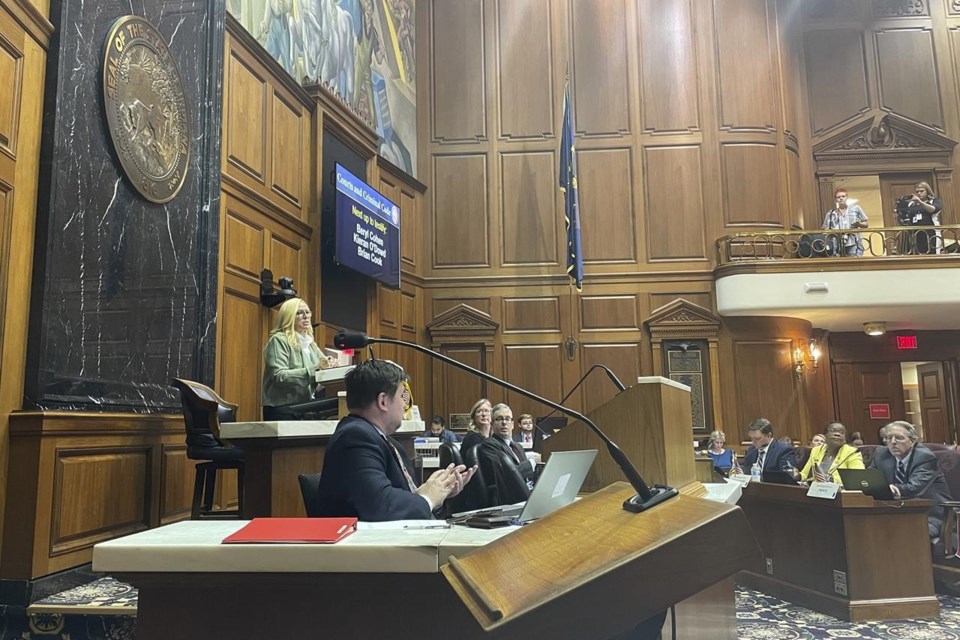INDIANAPOLIS (AP) — Doctors fear they could face criminal charges when they provide emergency treatment for pregnant women if becomes law, several physicians told state lawmakers Tuesday.
That testimony came after an Indiana House committee changed the abortion ban proposal by the Republican-dominated state Senate. The committee broadened the language to include an exception allowing abortions to protect the health of the mother and adjusted the time frame when abortions would be permitted in cases of rape and incest.
Republican Rep. Wendy McNamara of Evansville, who is sponsoring the bill, outlined the exceptions to protect the physical health and life of the mother, a frequent before a Senate committee last week. The amendment also would allow abortions if a fetus is diagnosed with a lethal anomaly.
It additionally removes the Senate-approved time frames based on age for abortions in cases of rape or incest — up to 12 weeks for those under 16 and eight weeks for those 16 and older. The House version, instead, would create a blanket ban after 10 weeks post-fertilization on abortions in cases of rape and incest. Victims would also no longer be required to sign a notarized affidavit attesting to an attack.
Several dozen people on both sides of the abortion debate filled a Statehouse corridor outside the six-hour-plus committee meeting, where chants such as “safe and legal” from abortion-rights supporters could be heard inside.
The House committee was expected to vote later Tuesday on whether to advance the bill to the full House for action later this week.
Dr. Daniel Elliott, representing the Indiana chapter of the American College of Emergency Physicians, told the committee that the group worried that a broad abortion ban could allow prosecutors to second-guess the emergency decisions of doctors, leaving them exposed to criminal charges.
The House proposal would require the state medical board to revoke the licenses of doctors found to have performed illegal abortions.
“In emergency situations, physicians often work with a lack of complete information and must make quick decisions in the best interests of our patients,” Elliott said. “Overall, we feel like licensure and going to the medical licensing board is where the gray areas within medicine should lie.”
The Indiana proposal followed a political firestorm over a who traveled to the state from neighboring Ohio to end a pregnancy. The case said the child had to travel to Indiana because a new Ohio law bans abortions if cardiac activity can be detected in an embryo or fetus, usually around six weeks of pregnancy.
Anti-abortion activists said they were offended that women from Ohio and Kentucky were coming to Indiana for abortions after strict laws took effect in those states following the U.S. Supreme Court’s decision overturning Roe v. Wade. They said Indiana shouldn’t allow any exceptions, arguing all abortions are “murder” and “evil” and that the should be strictly enforced.
Jodi Smith, a lobbyist for the anti-abortion group Indiana Right to Life, said the organization remained opposed to the proposal because it is too lax. Smith said a signed affidavit should still be required for rape or incest exceptions and criticized the proposal’s language allowing abortions to protect the mother’s health as “very vague and poorly defined.”
“The concern is that will either open carte blanche of opportunity for abortion-minded doctors, or it could ensure that good doctors that need more clarity don’t know what the allowable procedures are, and they will hesitate,” Smith said. “Either option, it ends poorly for women.”
Republicans who control the Indiana House are facing should be after the bill cleared the Senate on Saturday in a 26-20 vote, the minimum number of votes needed to pass. A few Republican senators said they opposed the bill as written but wanted the bill to stay alive for consideration during the special legislative session, which must adjourn by Aug. 14.
___
Arleigh Rodgers is a corps member for the Associated Press/Report for America Statehouse News Initiative. is a nonprofit national service program that places journalists in local newsrooms to report on undercovered issues. Follow her on Twitter at
___
Find AP’s full coverage of the overturning of Roe v. Wade at:
Arleigh Rodgers And Tom Davies, The Associated Press



